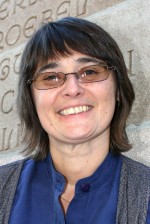Elementary school students learning English as a second language will benefit from groundbreaking research by University of Florida education professor Ester de Jong, in new studies supported by her recent appointment to the College of Education’s prestigious B. O. Smith Research Professorship.
 While occupying the three-year post, de Jong will investigate ways that elementary teachers can best help young English language learners (ELLs) bridge the language gap in order to succeed in school. Her research focuses not on conversational English but on the “academic language”—the language of school, textbooks and testing—that is vital to school success.
While occupying the three-year post, de Jong will investigate ways that elementary teachers can best help young English language learners (ELLs) bridge the language gap in order to succeed in school. Her research focuses not on conversational English but on the “academic language”—the language of school, textbooks and testing—that is vital to school success.
The B.O. Smith endowed professorship supports new, cutting-edge research of promising education faculty who are preparing to go up for full professor. It carries the potential for $3,000 annually in research funding and a $5,000 yearly salary stipend, renewed year to year based on research progress, for a total award package of $24,000. Appointments last three years and are staggered so a new professorship is awarded annually.
Cynthia Griffin in special education is the other current B.O. Smith Professor. The professorship’s namesake is a former UF education faculty member in curriculum and instruction.
de Jong, an associate professor in bilingual and ESOL (English Speakers of Other Languages) education, said mastering academic language proficiency is essential for all students, but especially for bilingual learners still acquiring English. She said their learning is best supported when teachers purposefully develop academic language.
“Current research primarily focuses on academic language development at the secondary-level content areas. This study will take place in two partnering second-grade, dual language classes in a Duval County elementary school. Spanish is the language of instruction in one class and English in the other classroom,” said de Jong, a UF faculty member since 2001.
Recent studies show that more than a third of fourth-grade ELLs are behind their white peers in math and nearly half are behind in reading. More and more, researchers view ELL students’ lack of access to the development of academic language as a leading influence on academic achievement.
de Jong’s study will involve multiple teacher interviews and videotaped observations of teacher-student exchanges during classroom lessons in both Spanish and English.
“The findings,” de Jong said, “will contribute to our understanding of academic language in the classroom and will support effective professional development for teachers working with English language learners.”
de Jong, who speaks fluent Dutch, English and Spanish, is a nationally recognized authority in dual language education. She has published several research articles on the topic and is the sole author of the 2011 book, “Foundations of Multilingualism in Education: Principles to Practice.” She has an Ed.D. degree in literacy, language and cultural studies from Boston University.
“Dr. de Jong’s research funded by the B.O. Smith Professorship addresses a major gap in the international literature on bilingual education,” said Elizabeth Bondy, director of UF’s School of Teaching and Learning. “Her findings will position her to be competitive for significant additional external funding and will enhance the professional development of teachers working with English language learners.”
de Jong in 2009 was awarded a College of Education Faculty Enhancement Opportunity grant worth more than $35,000 to fund activities to enhance her expertise in the research, policy and practice of teaching in multilingual contexts. She used her added expertise to build on her current $1.2 million study (with co-researchers Maria Coady and Candace Harper) examining teacher effectiveness with students in Florida schools who speak English as a second language.
The B.O. Smith study continues research conducted in 2009-2010 in a dual language school in Massachusetts, sponsored by a $40,000 Spencer Foundation research grant.
CONTACTS
SOURCE: Ester de Jong, associate professor, UF College of Education, 352-273-4227; email edejong@coe.ufl.edu
WRITER: Larry Lansford, director, news & communications, UF College of Education, 352-273-4137; llansford@coe.ufl.edu